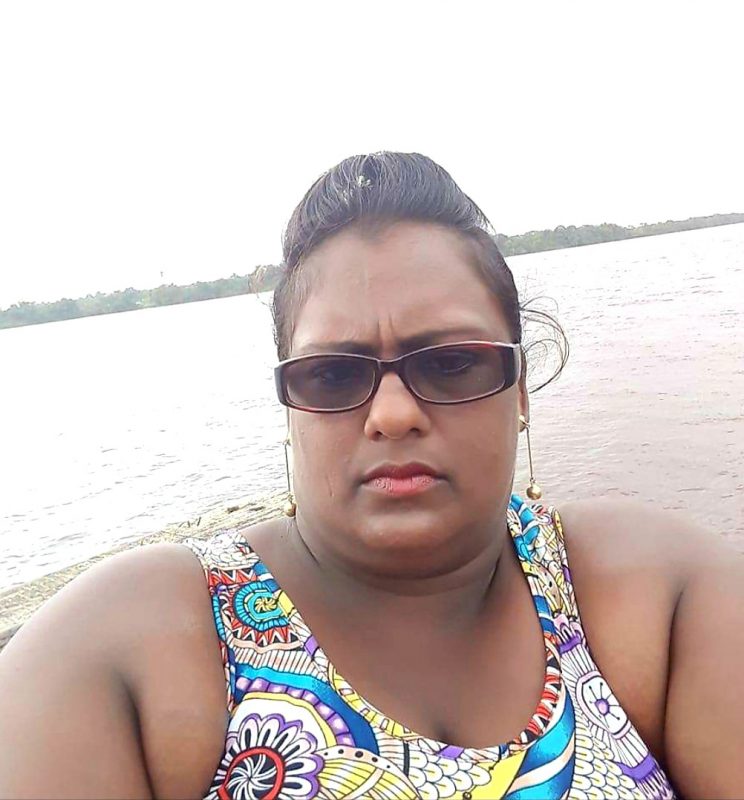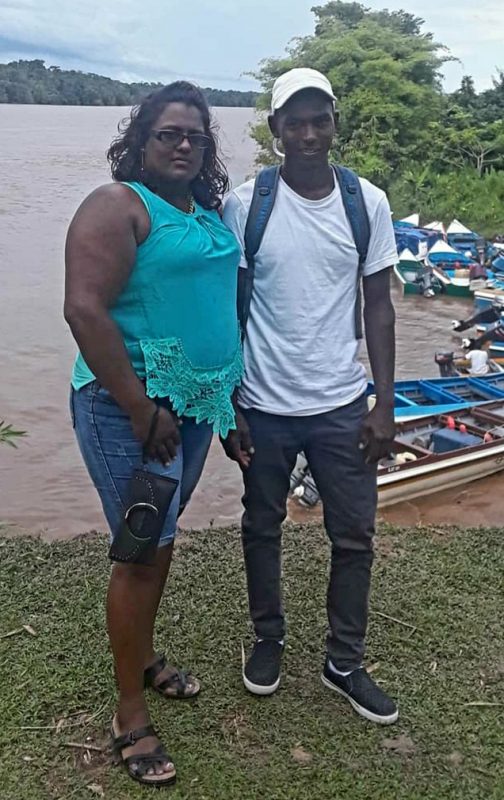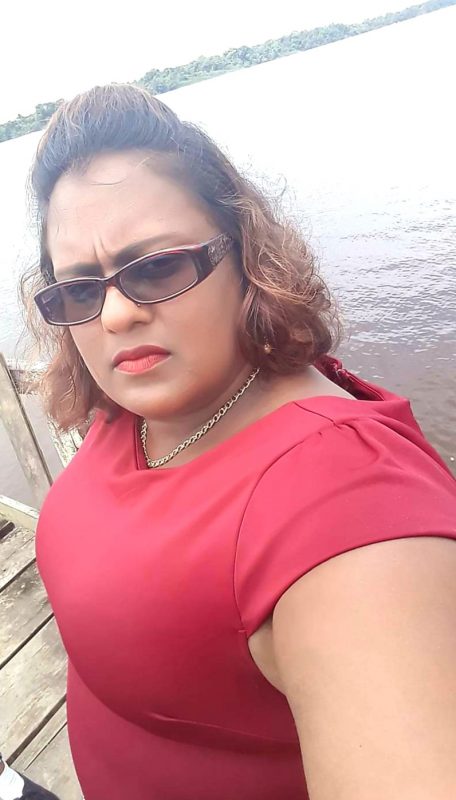A farmer, 37-year-old Patricia Amanda Persaud holds a number of positions in several voluntary organisations in her Western Hogg Island, Essequibo River community and strongly recommends the establishment of a secondary school or a secondary department to meet the needs of the student population in Hogg Island, Caria Caria, Great Troolie Island and mainland Buckhall.
The community activist, who was a high school dropout said: “I know what it is to be denied a secondary education. I would recommend the establishment of a secondary school or secondary department at Caria Caria and teachers be assigned to teach there. It would be easier for parents to look after their children. It would cut costs and be less traumatic for children being uprooted and sent to the dorms or with other families where they will have to readjust. If there is a secondary school or a well-equipped secondary department in the islands, a boat can drop students from Troolie island and Buck Hall to Caria Caria and another boat can drop students from Hogg Island to Caria Caria.”
The community has made that recommendation time and again to the authorities, Persaud told Stabroek Weekend during a recent interview.
“Last month, the parents asked for that again. We put that to our regional councillor who we expect will represent us at the level of the Regional Development Council. We have had outstanding students from the area. We have teachers from Hogg Island who are teaching in other parts of the country and doing well. We had a former regional chairman from here,” she said.
All of the children of the chairman of Caria Caria Community Development Councillor Everly Sampson are national cricketers. “Her daughter is playing under-15 cricket. Her second son is playing under-19 cricket and her eldest is on the national side. They had their secondary education on the Essequibo Coast. They are exceptional because of the persistence of their parents,” she noted.
Stating that the community would like to see priority given to secondary education in the Essequibo Islands, Persaud said, “Secondary schooling is non-existent in the islands. Our children have to go to Essequibo Coast or to the West Side [West Coast Demerara] to get a secondary education. Most students live in the dorms at Aurora Secondary or Anna Regina Multilateral or with families on the West Side.”
As an immediate solution she suggested the Ministry of Education or the Teaching Service Commission appoint teachers, who could teach the Caribbean Secondary Education Certificate (CSEC) examinations syllabus, to a school on one of the islands so children can go from their home to a school there.
She noted that Caria Caria, Great Troolie Island, Hogg Island and neighbouring Buckhall, which is on the mainland all have children who are being denied a secondary education because of the absence of any proper secondary education in the area.
“With all the islands and Buckhall combined we would have a secondary school population of about 200 children or more to start with, if they are to continue beyond grade six. Caria Caria has the biggest population among the islands here. I would recommend there be a secondary school or a secondary department at Caria Caria,” she stressed. “We do not have any teachers to teach secondary education, only primary and nursery. It is only now our teachers are being trained. In the recent past we had no trained teachers. Maybe in the next three years we will have all our teachers trained.”
Noting that it is very costly for parents to send their children to schools on the Essequibo Coast or to West Demerara, Persaud said many parents do not have their own means of transportation – boats and outboard engines – to take the children to and from school out of the area.
“Parents wouldn’t be bothered if children go for a two-week period to write the exams on the West Side or the Essequibo Coast instead of having them in the dorms at Aurora Secondary or elsewhere for the entire school year. What we are looking at is obtaining the education where we live. Children at Buck Hall used to go to school at Great Troolie Island,” she said.
“If the Department of Education or Ministry of Education or the Regional Democratic Council could provide a boat or boats to transport children to a central location at Caria Caria that would solve the big problem of accessing secondary education. Hogg Island is the furthest of the other islands and as such will require its own boat.”
Dropped out of school
In 2001, Persaud dropped out of Zeeburg Secondary School, West Coast Demerara when she was in third form because of the death of her mother. “I had to return home to look after my brother and sister,” she recalled. “If there was a secondary school on one of the islands or a secondary department at Western Hogg Island Primary that offered the Caribbean Secondary Education Certificate examinations I would have been able to continue my education.
“This is one of the reasons why I say that if secondary education could be accessed at home many children will not be denied secondary education. If education could have been accessed at home, I would not have had to go to Zeeburg. I would not have had to drop out of school. So I would say I was denied a secondary education or a tertiary education because of no secondary school in my area.” While at Zeeburg Secondary she had stayed with an aunt.
“We have real, good students coming up. If we could get our own teachers here trained and qualified, those who drop out of secondary schools on the Essequibo Coast or wherever can continue their education. We do have a lot of school dropouts… They go for the first year, second year, third year then drop out for varying reasons.”
Persaud, who has had no formal education since she dropped out of school, has attended workshops and training sessions in and out of the community.
“I use them to learn as much as possible and I encourage others to take advantage of these training opportunities,” she said.
When told that she expresses herself very well, she said, “Not to the fullest.” She noted that people, including senior government officials and private sector executives are often surprised by the manner in which she represents herself and others when they learn she only went up to third form in secondary school.
Activist
Married and the mother of two sons, Persaud is the secretary of Hogg Island Community Development Council (CDC), secretary of the Progressive Farmers Group, secretary of Hogg Island Community Policing Group and secretary of Hogg Island People’s Progressive Party Group.
“I have been doing voluntary community work since my early 20s,” she revealed. “Working with the community is the best thing for me. I represent all of Hogg Island. It is one of my goals to help the citizens of my community with their problems, work with them to solve them. Whenever anyone asks me for help I go out and help. People in Hogg Island are fairly cooperative.”
Hogg Island, the largest of all the islands in the Essequibo River, has 150 households.
“When I started getting involved with community activities it was difficult but now representation and talking on behalf of other people comes very easily. I handle everything in the community fairly smoothly. When officials visit the area, I represent at that level with the backing from the community,” she added.
She became involved in community work at a young age after seeing her grandfather take a leading role in the community. “He was seen as a leader in Hogg Island. He was very involved with his party, the PPP. Maybe I took after him,” she said. “When I was small it was one of my goals to do community work. I liked what he was doing and my father was also a good community activist when he was alive. He played cricket and he always tried bringing people together. My family background is like that so I guess it is in my genes. I’m just carrying on what they started.”
As the farmer’s representative, Persaud and her group have worked with the National Drainage and Irrigation Board [NDIB] to rehabilitate the drainage and irrigation canals for farmers.
Watermelon, pumpkin, corn, banana and plantain are the main crops planted in the area. Some farmers plant cash crops like boulanger, bora and ochro. Crops are sold wholesale at Parika on the East Bank Essequibo.
“Now that our economy is in a better shape, lots of things could be done for the islands,” she noted. “The area is agricultural and could make a greater contribution to the economy. We do cattle rearing and part-time fishing. There is need for agricultural equipment for the community and the need to upgrade the playfield. We are also asking for vocational training or remedial education for young adults and school dropouts found in our community.”
As a CDC representative, Persaud said, she is on call 24 hours a day; “I give people that option to call me at any time.”
As the CDC secretary, Persaud interacts with local government authorities. “We have made representation for several things in our community. We have to maintain government’s facilities. We have to keep the compounds of our schools, health centre and teachers’ quarters clean. We have one or two kokers we have fixed and we have to maintain them for farmers,” she said.
Neighbours
Relationships with neighbouring islands and Buckhall are fairly good. “We have to live that way. We have to look out for one another,” she noted “Businessman Yano Persaud at Buckhall assists us quite a bit.”
Whenever Persaud does not understand something about her role in the community she contacts her CDC counterparts at Caria Caria or Great Troolie Island and together they try to sort out the issues. “Whenever we reach up, we exchange ideas, talk about what is taking place in the communities and how we can link some things together. We work things out like that,” she added.
In the past, she worked with the Aurora Gold Mines (AGM) under the Guyana Goldfields banner and through representation secured a playpark for the children and a laptop and printer for Western Hogg Island Primary School. The island has another school at Northern Hogg Island. In the past, AGM also hosted Christmas parties for the children. Last year, the Mohammed family donated toys for the children.
While none of the islands have a Neighbourhood Democratic Council, Persaud said she would like to see more government officials visit, “not only … my community but in all the riverain communities. Funding should not be an issue anymore to help us develop ourselves. We need to see more development. Come and hear how they could help us so we can help ourselves. We all know that Hogg Island is the largest island in the Essequibo River. We have no running water on the island. A well is there but it is not functional. We catch water in the black tanks and when that runs out we settle river water and then boil it to drink.”
Noting that the community has no boat and engine of its own, Persaud said some people have their own boats which they use to help others especially in emergencies. “I have my own which I use to do my community work and to help others when the need arises. Everyone who has a boat and engine assists the other. There is a lot of potential to develop and to raise the standard of living,” she said.
She noted there are many other issues including sewage disposal and health services that need looking into. There is a health centre and a community health worker in Northern Hogg Island but none in Western Hogg Island.
“We need a health centre at the western end of Hogg Island. The island is big, bigger than the island of Barbados. Every month, a team from Parika Health Centre’s maternal and child care department visits us. There is no service in between those monthly visits. We need a health centre at Western Hogg Island,” she noted.














